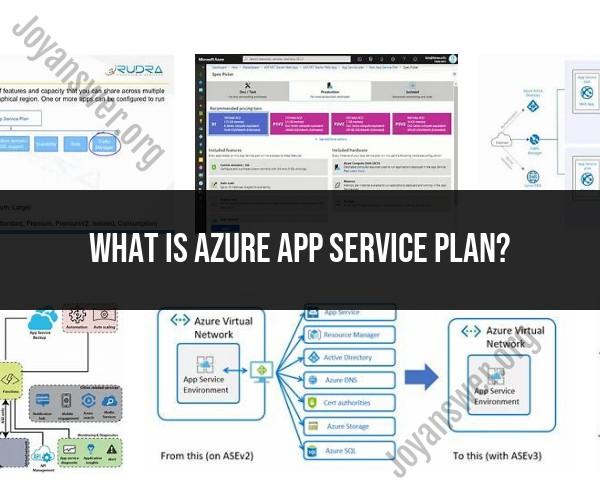What is Azure App service plan?
An Azure App Service Plan is a fundamental component of Microsoft Azure's platform-as-a-service (PaaS) offering for hosting web applications, APIs, and mobile app backends. It is a crucial infrastructure component that defines the region, size, and scaling capabilities of the underlying virtual machines (VMs) that host your app services. Here are some essential insights about Azure App Service Plans:
Resource Allocation: An App Service Plan allocates a set amount of computing resources, including CPU, memory, and disk space, to your web applications or APIs. These resources are shared among the apps deployed within the same plan.
Region: You select a specific Azure region where the App Service Plan will be hosted. The region determines the physical location of the underlying VMs and impacts factors like latency and data residency compliance.
Pricing Tiers: Azure offers various pricing tiers for App Service Plans, each with different levels of resource allocation and capabilities. The available tiers include Free, Shared, Basic, Standard, Premium, PremiumV2, and PremiumV3, with increasing levels of performance and features.
Scaling: App Service Plans provide scaling flexibility. You can scale vertically (upgrading to a higher pricing tier for increased resources) or horizontally (adding more instances) to handle increased traffic and workload demands.
Isolation: Higher-priced tiers provide better isolation between apps within the same plan. In Premium and PremiumV2 tiers, for example, your apps run in dedicated VMs, ensuring better performance and security isolation.
Auto-scaling: Azure App Service Plans offer auto-scaling capabilities, allowing you to configure rules that automatically adjust the number of instances based on performance metrics or a predefined schedule.
High Availability: Azure App Service Plans are designed for high availability. They run on multiple VM instances to provide redundancy and ensure your apps remain available even in the event of hardware or infrastructure failures.
Custom Domains: You can configure custom domains and SSL certificates for your web apps within an App Service Plan, enabling you to use your own domain names and secure your applications with HTTPS.
Deployment Slots: App Service Plans support deployment slots, allowing you to create separate environments for development, testing, and production. Each slot can host a copy of your app, making it easier to stage and test changes before promoting them to production.
Scalable Architecture: Azure App Service Plans are designed to support microservices and containerized applications. You can deploy multiple app services within the same plan, making it easier to manage and scale your application architecture.
Billing: App Service Plans are billed based on the pricing tier and the number of instances you use. You are charged separately for the resources allocated to the plan and the additional resources consumed by your apps.
Integrated Services: Azure App Service Plans integrate with various Azure services, such as Azure SQL Database, Azure Functions, and Azure Logic Apps, allowing you to build comprehensive cloud-based applications.
Choosing the right Azure App Service Plan is essential to meet the performance, scalability, and cost requirements of your applications. It's important to assess your app's needs, expected traffic patterns, and budget to determine the most suitable plan and pricing tier. Azure's flexibility allows you to start with a lower-tier plan and scale up as your application grows.













